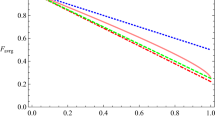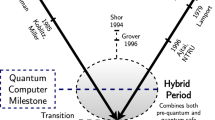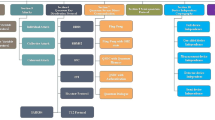Abstract
Fusing the ideas of quantum multicast communication and quantum assisted cloning, we propose a scheme for two-type-output assisted cloning of arbitrary unknown single-qubit states, which can synchronously output accurate copies and orthogonal-complement copies of two different arbitrary unknown single-qubit states with a minimal assistance from a state preparer. In this scheme, a four-qubit maximally entangled cluster channel, classical communication, and several local quantum gates are employed. Quantum teleportation is required in the first stage of the scheme and in the second stage, the state preparer disentangles the left over entangled states by a two-qubit projective measurement process and conveys some classical messages to different parties so that accurate copies or orthogonal-complement copies are produced. To produce more copies or orthogonal-complement copies in the two-type-output assisted cloning scheme, we discuss our scheme for producing two copies and three copies of each unknown single-qubit state and suggest how to generalise this to N copies and orthogonal-complement copies of each unknown single-qubit state using the product of two multi-qubit GHZ-type states as quantum channel. In addition, by using the product of N EPR pairs as the quantum channel, the two-type-output assisted cloning scheme for arbitrary unknown single-qubit states is extended to the case of N-type-output (\(N\ge 3\)) to meet the needs of the development of quantum networks.

Similar content being viewed by others
References
Kollmitzer, C., Pivk, M.: Applied quantum cryptogaraphy. Springer, Heidelberg (2010)
Bennett, C. H., Brassard, G., Crepeau, et al.: Teleporting an unknown quantum state via dual classical and Einstein-Podolsky-Rosen channels. Phys. Rev. Lett. 70(13), 1895–1899 (1993)
Peng, J.Y., He, Y.: Annular controlled teleportation. Int. J. Theor. Phys. 58, 3271–3281 (2019)
Zhou, P., Li, H.X., Deng, F.G., et al.: Multiparty-controlled teleportation of anarbitrary m-qudit state witha pure entangled quantum channel. J. Phys. A: Math. Theor. 40, 13121 (2007)
Peng, J.Y., Tang, L., Yang, Z., et al.: Cyclic teleportation in noisy chanel with nondemolition parity analysis and weak measurement. Quantum Inf. Process. 210, 114 (2022)
Lo, H.K., Curty, M., Qi, B.: Measurement-device-independent quantum key distribution. Phys. Rev. Lett. 108, 130503 (2012)
Huang, W.: Improved multiparty quantum key agreement in travelling mode. Sci. China Physics, Mech. Astron. 59(12), 120311 (2016)
Pati, A.K.: Minimum classical bit for remote preparation and measurement of a qubit. Phys. Rev. A 63, 014302 (2001)
Peng, J.Y.: Remote preparation of general one-, two- and three-qubit states via \(\chi \)-type entangled states. Int. J. Theor. Phys. 59, 3789–3803 (2020)
Li, J.F., Liu, J.M., Feng, X.L., et al.: Deterministic remote two-qubit state preparation in dissipative environments. Quantum Inf. Process. 15, 2155–2168 (2016)
Peng, J.Y., Bai, M.Q., Tang, L., et al.: Perfect controlled joint remote state preparation of arbitrary multi-qubit states independent of entanglement degree of the quantum channel. Quantum Inf. Process. 20, 340 (2021)
Hillery, M., Bužek, V., Berthiaume, A.: Quantum secret sharing. Phys. Rev. A 59, 1829–1834 (1999)
Peng, J.Y., Mo, Z.W.: Quantum sharing an unknown multi-particle state via POVM. Int. J. Theor. Phys. 52(2), 620–633 (2013)
Shi, R.H., Huang, L.S., Yang, W., et al.: Asymmetric multi-party quantum state sharing of an arbitrary m-qubit state. Quantum Inf. Process. 10, 53–61 (2011)
Peng, J.Y., Bai, M.Q., Mo, Z.W.: Hierarchical and probabilistic quantum state sharing via a non-maximally entangled \(|\chi \rangle \)state. Chinese Physics B 23, 010304 (2014)
Lai, H., Pieparzyk, J., Luo, M.X., et al.: High-capacity (2,3) threshold quantum secret sharing based on asymmetric quantum lossy channels. Quantum Inf. Process. 19, 157 (2020)
Peng, J.Y., Bai, M.Q., Mo, Z.W.: Bidirectional quantum states sharing. Int. J. Theor. Phys. 55, 2481–2489 (2016)
Pati, A.K.: “Assisted cloning” and “orthogonal-complementing” of an unknown state. Phys. Rev. A 16, 022308 (2000)
Scarani, V., Lblisdir, S., Gisin, N., et al.: Quantum cloning. Rev. Mod. Phys. 77, 1225 (2005)
Han, L.F., Yuan, H., Yang, M., et al.: Assisted cloning of an arbitrary unknown tow-qubit state via agenuine four-qubit entangled state and positive operator-value measure. Indian J. Pure Appl. Phys. 52, 563–570 (2014)
Murao, M., Vedral, V.: Remote information concentration using a bound entangled state[J]. Phys. Rev. Lett. 86(2), 352–355 (2001)
Peng, J.Y., Luo, M.X., Mo, Z.W.: Remote information concentration via four-particle cluster state and by positive operator-value measurement. International Journal of Modern Physics B 27(18), 1350091 (2013)
Peng, J.Y., Lei, H.X., Mo, Z.W.: Faithful remote information concentration based on the optimal universal \(1\rightarrow 2\) telecloning of arbitrary two-qubit states. Int. J. Theor. Phys. 53(5), 1637–1647 (2014)
Wootters, W.K., Zurek, W.H.: A single quantum cannot be cloned. Nature 299(5886), 802–803 (1982)
Dieks, D.: Communication by EPR devices. Phys. Lett. A 92(6), 271–272 (1982)
Yuen, H.P.: Amplification of quantum states and noiseless photon amplifiers[J]. Phys. Lett. A 113(8), 405–407 (1986)
Pati, A.K., Braunstein, S.L.: Impossibility of deleting an unknown quantum state. Nature 404(6774), 164–165 (2000)
Zurek, W.H.: Quantum cloning. Schrödinger’s sheep. Nature 404(6774), 130 (2000)
Bužek, V., Hillery, M., Werner, R.: Optimal manipulations with qubits: universal NOT gate. Phys. Rev. A 60, R2626 (1999)
Gisin, N., Popescu, S.: Spin flips and quantum information for antiparallel spins. Phys. Rev. Lett. 83, 432 (1999)
Jozsa, R.: A stronger no-cloning theorem. https://doi.org/10.48550/arXiv.quant-ph/0204153
Pati, A.K.: Quantum cobwebs: Universal entangling of quantum states. Pramana 59(2), 221–228 (2002)
Landauer, R.: Irreversibility and Heat Generation in the Computing Process. IBM J. Res. Develop. 5, 183 (1961)
Bennett, C.H.: The thermodynamics of computation-a review. Int. J. Theoret. Phys. 21, 905–940 (1982)
Bužek, V., Hillery, M.: Quantum Copying: Beyond the No-Cloning Theorem. Phys. Rev. A 54(3), 1844 (1996)
Hillery, M., Bužek, V.: Quantum copying: Fundamental inequalities. Phys. Rev. A 56, 1212–1216 (1997)
Gisin, N., Massar, S.: Optimal quantum cloning machines. Phys. Rev. Lett. 79, 2153–2156 (1997)
Bruß, D., Divincenzo, D. P., Ekert. A., et al.: Optimal universal and state-dependent quantum cloning. Phys. Rev. A 57(4), 2368–2378 (1998)
Duan, L.M., Guo, G.C.: Probabilistic cloning and identification of linearly independent states. Phys. Rev. Lett. 80(22), 4999–5002 (1998)
Murao, M., Jonathan, D., Plenio, M.B., et al.: Quantum telecloning and multiparticle entanglement. Phys. Rev. A 59(1), 156–161 (1999)
Bruß, D., Cinchetti, M., Mauro, D.G., et al.: Phase covariant quantum cloning. Phys. Rev. A 62(1), 012302 (2000)
Werner, R.: Optimal cloning of pure states. Phys. Rev. A 58, 1827–1832 (1998)
Fan, H.: Quantum cloning of mixed states in symmetric subspace. Phys. Rev. A 68, 054301 (2003)
Zou, X.B., Pahlke, K., Mathis, W.: Scheme for the implementation of a universal quantum cloning machine via cavity-assisted atomic collisions in cavity QED. Phys. Rev. A 67, 024304 (2003)
Zhan, Y.B.: Assisted cloning of an unknown two-particle entangled state. Phys. Lett. A 336(4–5), 317–323 (2005)
Ma, P.C., Zhan, Y.B.: Scheme for implementing assisted cloning of an unknown d-dimension equatorial quantum state by remote state preparation. Commun. Theor. Phys. 51, 57–59 (2009)
Han, L.F., Yuan, H., Yang, M., et al.: Assisted cloning of anarbitrary unknown two-qubit state via a genuine four-qubit entangled state and positive operator-valued measure. Indian J. Pure Appl. Phys. 52, 563–570 (2014)
Hou, K., Shi, S.H.: Scheme for cloning an unknown entangled state with assistance via non-maximally entangled cluster states. Int. J. Theor. Phys. 48(1), 167–177 (2009)
Briegel, H.J., Raussendorf, R.: Persistent entanglement in arrays of interacting particles. Phys. Rev. Lett. 86, 910 (2001)
Zhan, Y.: A scheme for assisted cloning of a two-particle entangled state via GHZ class states. Chin. Opt. Lett. 3(101), S286–S289 (2005)
Ming, F., Yi, M.L., Jun, L., et al.: Assisted Cloning and Orthogonal Complementing of an Arbitrary Unknown Two-Qubit Entangled State. Commun. Theor. Phys. 46(5), 849–852 (2006)
Zhang, J.Z., Xia, Y.: Use of two-particle entangled states to teleport unknown two-particle quantum state. Comput. Eng. Appl. 51(18), 82–85 (2015)
Han, L. F.: Theoretical study on quantum state teleportation, assisted cloning and reconstruction. Anhui University (2015)
Araneda, G., Cisternas, N., Delgado, A.: Telecloning of qudits via partially entangled states. Quantum Inf. Process. 15, 3443–3458 (2016)
Yu, Y., Zhao, N.: General quantum broadcast and multi-cast communicatioms based on entanglement. Optics. Express. 26(12), 29296 (2018)
Peng, J.Y., Yang, Z., Tang, L., et al.: Controlled quantum broadcast and multi-cast communications ofcomplex coefficient single-qubit states. Quantum Inf. Process. 21, 287 (2022)
Yu, Y., Zha, X.W., Li, W.: Quantum broadcast scheme and multi-output quantum teleportation via four-qubit cluster state. Quantum. Inf. Process. 16(2), 41 (2017)
Nielsen, M.A., Chuang, I.L.: Quantum computation and quantum information. Cambridge University Press, New York (2000)
Bouwmeester, D., Pan, J.W., Mattle, K., et al.: Experimental quantum teleportation. Nature 390(390), 575 (1997)
Deng, F.G., Li, X.H., Zhou, H.Y., et al.: Improving the security of multiparty quantum secret sharing against Trojan horse attack. Phys. Rev. A 72, 044302 (2005)
Zhang, Z. J. , Yang, J. , Man, Z. X. , et al.: Multiparty secret sharing of quantum information using and identifying Bell states. Eur. Phys. J. D - Atomic, Molecular, Optical Plasma Phys. 33(1), 133–136 (2005)
Yang, X. W., Chen, X.: Preparation of Bell states by dissipating quantum Zeno dynamics and Rydberg pump effect. Journal of Fujian Normal University: Natural Science Edition 37(1), 8(2021)
Ding, D., Yan, F.L., Gao, T.: Entangler and analyzer for multiphoton Greenberger-Horne-Zeilinger states using weak nonlinearities. Sci. China Phys. Mechanics Astronomy 57(11), 2098–2103 (2014)
Zeng, S., Nie, Y.Y.: Remote preparation scheme for 4-particle cluster states. Journal of Jiangxi Normal University: Natural Science Edition 39(1), 79–81 (2015)
Barrent, S.D., Kok, P., Nemoto, K.: Symmetry analyzer for nondestructive Bell-state detection using weak nonlinearities. Phys. Rev. A 71, 060302 (2005)
Grice, W.P.: Arbitrarity complete Bell-state measurement using only linear optical ements. Phys. Rev. A 84(4), 5912–5916 (2011)
Acknowledgements
This work is supported by Natural Science Foundation of China (No. 11071178, 11671284), Sichuan Province Education Department Scientific Research Innovation Team Foundation (No. 15TD0027), and Taizhou University high level talents research initiation fund (No. TZXY2017QDJJ011).
Funding
This work is supported by Natural Science Foundation of China (No. 11071178, 11671284), Sichuan Province Education Department Scientific Research Innovation Team Foundation (No. 15TD0027), and Taizhou University high level talents research initiation fund (No. TZXY2017QDJJ011).
Author information
Authors and Affiliations
Contributions
All authors contributed to the study conception and design. All authors read and approved the final manuscript.
Corresponding author
Ethics declarations
Competing interests
All authors contributed to the study conception and design. All authors read and approved the final manuscript.
Additional information
Publisher's Note
Springer Nature remains neutral with regard to jurisdictional claims in published maps and institutional affiliations.
Rights and permissions
Springer Nature or its licensor (e.g. a society or other partner) holds exclusive rights to this article under a publishing agreement with the author(s) or other rightsholder(s); author self-archiving of the accepted manuscript version of this article is solely governed by the terms of such publishing agreement and applicable law.
About this article
Cite this article
Peng, Jy., Lei, Hx. & Tang, Jg. Multi-type-output Assisted Cloning of Unknown Single-qubit States. Int J Theor Phys 63, 7 (2024). https://doi.org/10.1007/s10773-023-05538-y
Received:
Accepted:
Published:
DOI: https://doi.org/10.1007/s10773-023-05538-y




